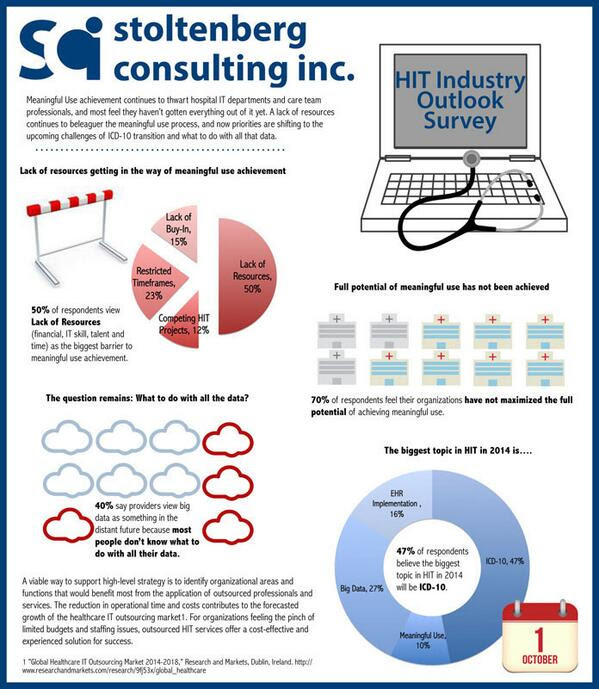70 percent of healthcare providers have not been able to maximize the full potential of meaningful use, according to a recent survey conducted by Stoltenberg Consulting Inc. The survey was conducted at the 2014 Health Information and Management Systems Society (HIMSS) annual conference held recently in Orlando, Florida.
Barriers to Maximizing Meaningful Use
50 percent of respondents revealed the lack of resources is or has been the biggest barrier to achieving meaningful use. Other meaningful use barriers cited include:
- restricted time frames (23 percent)
- lack of buy-in from their organizations (15 percent)
- competing health IT projects (12 percent)
Related: An In-Depth Look At The Meaningful Use State of Affairs for 2014
Biggest HIT Topics in 2014
The Stoltenberg survey identified the following top four HIT topics in 2014:
- ICD-10 (47 percent)
- Big data (27 percent)
- EHR implementation (16 percent)
- Meaningful use (10 percent)
Related: Infographic: 5 Health IT Trends for 2014
Another area the Stoltenberg survey addressed was big data. A majority of all responses (40 percent) to the question, “If big data is the next best thing, why do many HIT leaders view it as something in the distant future?” indicated that most healthcare organizations don’t know what to do with all their data.
Shane Pilcher, vice president, Stoltenberg Consulting commented that “organizations need to understand and differentiate big data from the more appropriate ‘smart healthcare data.’ Today, they are collecting data, which usually gets stored somewhere inside data warehouses in the hopes that it will eventually be used in the next five years or so. If organizations aren’t monitoring what they’re saving however, the quality and quantity of the data will not be sufficient when they are ready to use it. These organizations might think they have several years of historical data to draw from when they begin their analytics but in reality, the data is often not the quality, quantity or type that they need.”
Pilcher emphasized that “smart healthcare data is the key – focusing on the type of data they have, the volume of data, and the validity of data. They must make sure that what they’re collecting is what they’re expecting.”
Related: Survey: 95% of Healthcare CEOs Are Exploring Big Data Strategies and Solutions
An infographic illustrating the findings from the survey can be found below:

Featured image credit: dlanor smada via cc
